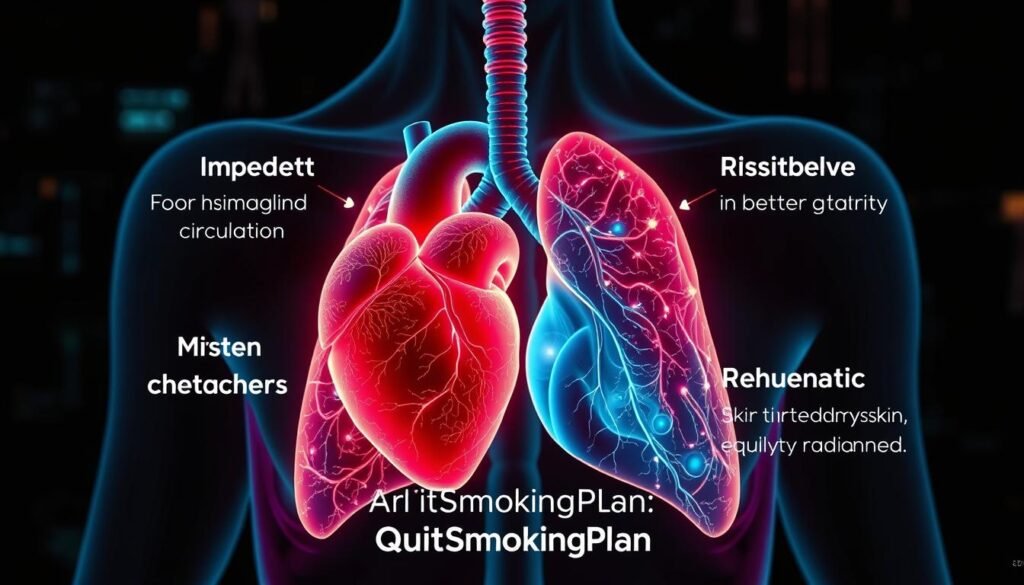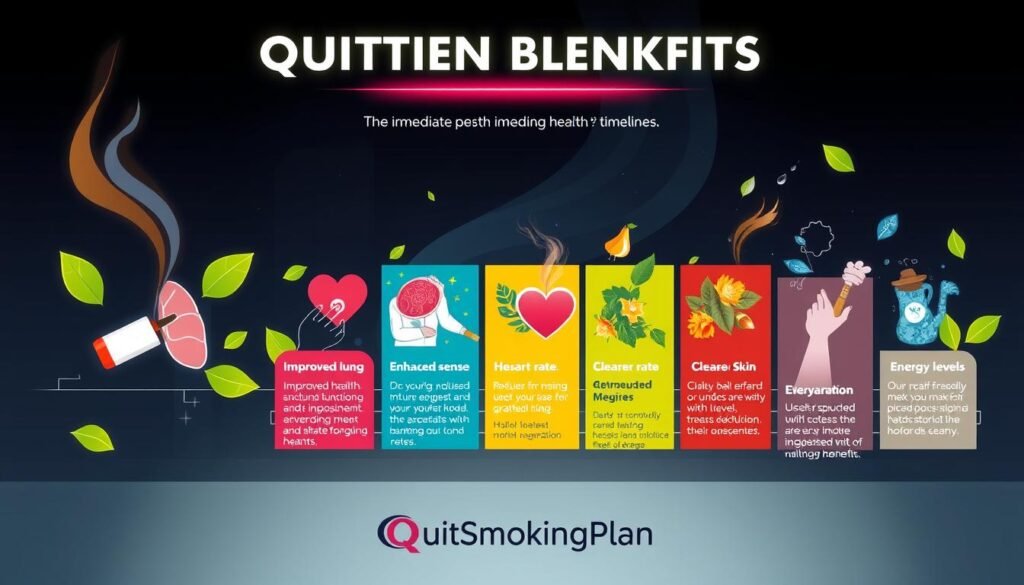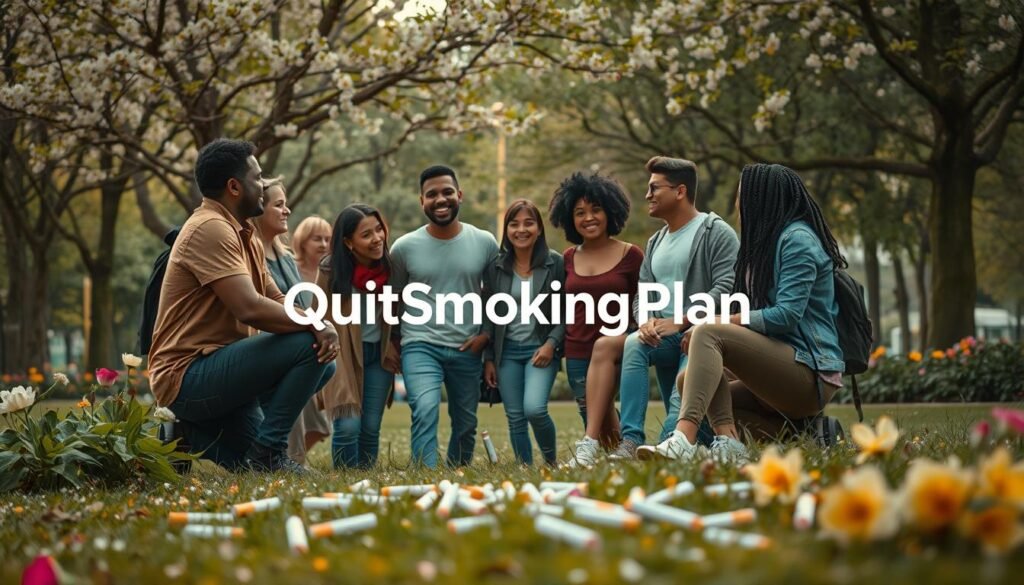Ever wondered how fast your body heals after quitting smoking? The benefits start quickly, and you’ll see changes in hours. Quitting can lower your heart rate and improve breathing. It’s good for you, no matter your age or smoking history.
In this article, we’ll look at the amazing health perks of quitting. You’ll see it’s never too late to make a change. Quitting tobacco can greatly improve your health and life.
Quitting tobacco lowers disease risks and boosts your energy. Plus, it can add up to 10 years to your life1. Remember, quitting is the first step to a healthier you.
Key Takeaways
- Immediate health improvements occur just hours after quitting smoking.
- Quitting smoking can significantly reduce heart rate and carbon monoxide levels.
- People of all ages benefit from quitting, regardless of smoking history.
- Health benefits of quitting have positive impacts on both respiratory and cardiovascular functions.
- Quitting can add up to 10 years to your life, enhancing overall quality of life.
The Importance of Quitting Smoking
Quitting smoking is a big step for your health. It helps avoid serious health problems like heart disease and cancer. You could live up to 10 years longer, showing how quitting is key.
Stopping smoking also helps those close to you. Secondhand smoke is harmful, so quitting benefits your family’s health. With fewer smokers in the U.S., prevention programs can help millions.
Quitting smoking has quick benefits. Your blood pressure and heart rate improve in just 24 hours. It also prevents chronic diseases from tobacco use. Quitting is crucial for a better life.
Learn more about the health benefits of quitting smoking. Your body starts healing quickly. You’ll see improvements in lung function and fighting infections early on. These changes help you and those around you stay healthy.
In short, quitting smoking is vital for your health and the health of others2.
Immediate Health Benefits of Quitting
Deciding to quit smoking brings instant health improvements that you can feel right away. When you start quitting, your body starts to get better almost instantly.
Reduction in Heart Rate and Blood Pressure
Just 20 minutes after quitting, your heart rate and blood pressure start to go down. This is a big change that helps your heart and blood vessels. It’s one of the first immediate quitting perks that shows quitting is worth it.
Normalization of Carbon Monoxide Levels
After 12 hours, the carbon monoxide in your blood goes back to normal. This means your body gets more oxygen. These quick changes show how quitting smoking is good for you, making it clear why you should stay smoke-free.

| Time Frame | Health Benefits |
|---|---|
| 20 minutes | Heart rate and blood pressure decrease |
| 12 hours | Carbon monoxide levels return to normal |
| 2-12 weeks | Circulation improves and lung function increases |
| 1-9 months | Coughing and shortness of breath decrease |
These quick changes show the instant health improvements your body gets from quitting. You start to feel fresher and healthier right away3.
Effects on Respiratory Function
Quitting smoking makes your body’s lungs work better. You’ll notice your lungs can hold more air, which is good for your health.
Improvement in Lung Function
Many people see big improvements in their lungs after quitting. Studies show lung function gets better in just a month. This is because your lungs start to heal faster.
By the end of this month, forced expiratory volume (FEV1) can go up by 200 mL4. As time goes on, your lungs work even better. This means you’ll cough less and breathe easier.
Reduction in Coughing and Shortness of Breath
Quitting smoking also means less coughing and feeling out of breath. In nine months, coughing gets much better. Your lungs clear out bad stuff, making it easier to move around.
This shows how quitting helps your body. It makes life easier and better. Your lungs start working better right away, showing big changes4.
Knowing how bad smoking is can help you quit. Smoking kills over 450,000 people every year worldwide5. Quitting saves your life and the lives of those around you.
Long-Term Health Benefits Begin Early
Stopping smoking starts your journey to better health right away. The benefits for your body are huge, with changes happening quickly. In the first few weeks, your body starts making big improvements.
How Quickly Your Body Starts Healing
Healing starts as soon as you quit smoking. Twenty minutes later, your blood pressure goes down and your blood flows better. In one day, your heart attack risk drops, and your senses of smell and taste get better.
By the end of a month, you breathe easier and cough less. At nine months, your lungs heal a lot, showing how strong your body is6.
Timeline of Health Improvements Post-Cessation
| Time Since Quitting | Health Improvement |
|---|---|
| 20 Minutes | Blood pressure drops, circulation improves |
| 1 Day | Risk of heart attack begins to decrease |
| 2 Days | Heightened sense of smell and improved taste |
| 1 Month | Lung function starts to improve, less coughing |
| 3 Months | Improved circulation |
| 9 Months | Significant lung healing |
| 1 Year | Risk for coronary heart disease is reduced by half |
| 5 Years | Stroke risk decreases to that of a non-smoker |
| 10 Years | Reduced risk of lung, mouth, throat, or pancreatic cancer |
| 15 Years | Likelihood of coronary heart disease equals a non-smoker |
| 20 Years | Risk of death from smoking-related causes nearly matches a non-smoker |
Quitting smoking brings many health benefits over time. You’ll see big drops in heart disease, cancer, and breathing problems risks. This shows quitting is very rewarding78.

Cardiovascular Health Improvements
Quitting smoking greatly improves your heart’s health. It leads to significant benefits for your cardiovascular system. Just 20 minutes after you stop, your blood pressure and heart rate start to get back to normal. This is a big step towards a healthier heart9.
Decrease in Heart Attack Risk
One year after quitting, your risk of heart disease and heart attacks drops by 50%9. This shows how fast your body starts to heal from smoking’s harm. Quitting is key to avoiding these risks. In 15 years, your heart disease risk is the same as a non-smoker’s10.
Reduction in Stroke Risk Over Time
Quitting smoking also lowers your stroke risk over time. Within 5 years, your stroke risk drops a lot. This shows how quitting is crucial for your health10. As you get healthier, you’ll see more benefits of quitting smoking. Smoking causes over seven million deaths worldwide each year, making quitting urgent11.
Positive Effects on Mental Health
Quitting smoking greatly improves mental health. Many people feel happier and less anxious after stopping. Smoking is linked to more anxiety and depression, making quitting crucial for those with mental health issues.
Studies show that quitting can help with anxiety and depression as much as antidepressants12. You might feel less stressed and happier after quitting. Nicotine cravings can make you feel irritable, but quitting helps overcome this12.
Quitting also boosts self-worth and confidence. It improves the quality of life and emotional well-being. People find more joy in daily activities after quitting12.
Free and anonymous quit support programs are available. They help everyone during the transition away from nicotine here.

Quitting Tobacco and Cancer Risk
It’s important to know the quitting tobacco benefits, especially for lowering cancer risk. Smoking causes about 480,000 early deaths in the U.S. each year. This includes 36% of deaths from cancer13. Quitting smoking greatly lowers your risk of getting different types of cancer.
Lowered Risk of Various Cancers
Studies show quitting smoking before 35 can cut cancer risk by more than 90%14. Every year you don’t smoke, your risk goes down more. Quitting before 40 can almost fully restore lost life years14. This shows the big positive effects of quitting smoking, especially for lung and throat cancers.
Importance for Cancer Survivors
Cancer survivors gain a lot from stopping tobacco use. Stopping smoking improves survival chances and lowers the chance of cancer coming back. This is key for long-term health. Quitting is a big step towards a healthier future.
| Age of Quitting | Cancer Risk Reduction | Life Expectancy Gain (Years) |
|---|---|---|
| Before 35 | 90%+ | Regain almost all |
| 35 – 44 | Significant | 9 |
| After 40 | Decreases over time | Variable |
The Role of Sense of Taste and Smell
Quitting smoking brings back your sense of taste and smell. Many people say they can taste and smell better after they stop smoking. Smoking can make these senses dull, making food and smells less enjoyable.
As your body heals, you’ll notice a big improvement in how you taste and smell things. Studies show that smokers often have trouble with their senses, which can affect their happiness. Quitting lets you enjoy food and smells more, making meals a highlight of your day.
Quitting smoking brings many daily joys, making it easier to stay on track. It not only improves your senses but also helps you eat healthier. These changes are good for your overall health and happiness.
Research shows that smokers have trouble recognizing tastes and smells compared to non-smokers. You can learn more about this in a scientific article15.

Effects on Physical Appearance
Quitting smoking does more than just improve your health; it also makes you look better. Your skin will likely get healthier and look clearer. Smoking can make you look older by causing wrinkles and blemishes.
Smokers often look older than they really are. Quitting can make your skin look younger and smoother.
Improved Skin Health
Quitting smoking makes your skin more elastic and radiant. It can clear up blemishes and reduce wrinkles. This is because smoking harms your skin.
Smokers may look older than non-smokers. Quitting can make you look younger. It prevents more damage to your skin, making you look healthier.
Whitening of Teeth and Reduction of Stains
Quitting smoking also improves your teeth. Tobacco stains teeth and harms your mouth. Stopping smoking can make your teeth whiter.
It also lowers the risk of gum disease. This can prevent serious dental problems. Healthier gums and whiter teeth boost your confidence and self-image.
| Visual Improvements | Effects of Quitting Smoking |
|---|---|
| Skin Elasticity | Increases over time, leading to a more youthful appearance |
| Wrinkles | Fewer wrinkles develop after quitting |
| Skin Radiance | Improved due to the reduction of toxins in the body |
| Tooth Stains | Reduction in stains, resulting in whiter teeth |
| Gum Health | Decreased risk of gum disease and inflammation |
Financial Benefits of Quitting Smoking
Quitting smoking is good for your health and your wallet. Smokers often don’t realize how much they spend on cigarettes each year. By stopping, you can save money and spend it on better things.
Cost Savings Over Time
Smokers can save a lot of money by quitting. For example, a pack-a-day smoker can save between $2,700 and $5,140 a year18. This is a big incentive to quit, especially since employers can save money too19.
Quitting can also lead to lower medical costs and more productivity. In the U.S. federal workforce, it could save $59 million in medical costs and $332 million in absenteeism costs over five years20.
Utilizing Savings for Healthier Alternatives
After quitting, you can use the saved money for healthier choices. You could join a gym or buy healthy food. This not only improves your health but also makes your life better.

| State | Annual Savings from Quitting (Lowest) | Annual Savings from Quitting (Highest) |
|---|---|---|
| New York | $1,030 | $5,140 |
| North Carolina | $2,720 | $5,140 |
| New Hampshire | $2,270 | $5,750 |
Knowing the financial benefits of quitting smoking helps you control your health and money192018.
Impact on Family and Friends
Quitting smoking has big benefits for quitting smoking for family and friends. It makes their environment healthier. By stopping, you lower the risks of secondhand smoke, which is harmful to those around you.
Children exposed to secondhand smoke are at higher risk for asthma, heart disease, and SIDS21. Keeping them safe from these dangers helps them stay healthy and happy in a smoke-free space.
Also, having support from family and friends is key to quitting smoking. Those with positive views on tobacco use were 32% less likely to quit22. This support boosts your chances of quitting and strengthens your bonds with loved ones.
Quitting not only improves your health but also sets a good example. It inspires others to quit, making social connections better and stronger. This change leads to more positive and smoke-free experiences together.
| Health Risks of Secondhand Smoke | Potential Effects on Children |
|---|---|
| Sudden Infant Death Syndrome (SIDS) | Increased risk of SIDS |
| Asthma | Higher likelihood of developing asthma |
| Cardiovascular Issues | Increased risk of cardiovascular diseases |
| Cancer | Potential for developing cancer later in life |
Quitting smoking is more than just personal health. It makes your family and friends safer and happier21. This change helps everyone move towards healthier lives together.
Social Benefits and Reduced Stigma
Quitting smoking brings big social wins that make your life better. With more places going smoke-free, it’s key to stop smoking in public. Being a non-smoker lets you join in more places where smokers might not fit in.
Less stigma around smoking makes social life better. People who quit often feel more accepted by their friends. Friends and family are key in helping you quit, offering the support you need23.
Quitting also boosts your mental health. It makes you feel better about yourself and your life. This can lead to stronger, happier relationships24.

| Social Benefits | Details |
|---|---|
| Improved Interactions | Greater participation in social events due to smoke-free environments. |
| Reduced Stigma | Smokers experience less judgment, leading to more inclusive social experiences. |
| Enhanced Relationships | Quitting supports better relationships due to increased confidence and health factors. |
| Boosted Support | Encouragement from friends and family enhances the likelihood of successful cessation23. |
Quitting smoking can make your social life richer. It shows the big social benefits of quitting smoking. It’s also important to have places where smoking is not welcome25.
Improving Quality of Life
Quitting smoking changes your life for the better. You can do more things without getting tired or out of breath. Studies show that quitting makes you feel healthier and happier because you’re more satisfied with your26.
Enhanced Daily Activities
Quitting smoking makes you healthier and more active. You can play sports or go for walks without getting as tired. Feeling free from smoking’s limits makes you happier27.
Greater Overall Health Satisfaction
Quitting smoking also makes you feel better overall. People who quit smoke less and feel less stressed. They’re happier and more content with their health28.
The Importance of Support in Quitting
Quitting smoking is a journey that’s better with support. Having a support system can greatly improve your chances of success. There are many resources available to help you on this challenging path.
Resources for Smoking Cessation
Combining behavioral support with medication can lead to better results. Personalized strategies can make quitting easier and more effective. Here are some resources to consider:
- Counseling Services: Professional counselors offer tailored support to address individual triggers and coping strategies.
- Support Groups: Connecting with others who are also trying to quit can foster a sense of community and understanding.
- Nicotine Replacement Therapy (NRT): Tools such as patches and gums can aid in reducing cravings and withdrawal symptoms.
- Prescription Medications: Options like Bupropion (Zyban) and Varenicline (Chantix) have been shown to significantly lower the likelihood of returning to smoking29.
- Behavioral Therapy: This approach helps individuals adjust lifestyle habits and manage triggers effectively30.
Many people feel less anxious, more energized, and happier after quitting smoking29. Starting the journey to quit can be tough. But with the right support, you can overcome challenges and make lasting changes.

What to Expect After Quitting
Knowing what happens after you quit smoking is key to a smoke-free life. You might face withdrawal symptoms that make it tough. These include feeling irritable, having cravings, and trouble focusing. Spotting these signs is the first step to managing them.
Common Withdrawal Symptoms
As you start this journey, knowing common withdrawal symptoms is vital. These might include:
- Irritability
- Cramps and headaches
- Increased appetite
- Sleep disturbances
- Intense cravings
After 24 hours without smoking, your body’s nicotine levels drop. This can lead to withdrawal symptoms31. Knowing these symptoms are temporary can keep you on track.
Strategies for Managing Cravings
Managing withdrawal symptoms is key to beating cravings and staying smoke-free. Here are some effective ways:
- Engage in physical activities to lift your mood and distract you from cravings.
- Practice mindfulness or meditation to lower stress and improve focus.
- Try chewing gum or snacking on healthy foods to keep your mouth busy.
- Utilize support groups or online resources to connect with others facing similar challenges.
These strategies can greatly help you stay smoke-free. Remember, getting help and building a support network is crucial during this time. You have the power to overcome these challenges effectively.
Conclusion
Quitting smoking brings many health benefits right away. You can cut your risk of heart attacks by 50%. This means fewer early deaths for smokers who stop at 35 or older32.
Also, your lungs start to heal in just three months. In a year, you’ll see big health improvements. These include better wound healing and less anxiety3233.
Quitting also helps others. Smokers who quit before 50 live as long as non-smokers. They face less risk of lung cancer and heart disease3330.
Quitting makes you mentally and physically better. It also makes life more fulfilling. The benefits are huge, from saving money to feeling better overall3233.
Start quitting today for a better life. You’ll save money and feel great. Your future self will thank you for these positive choices3233.
FAQ
What are the immediate health benefits of quitting smoking?
How quickly can I expect to see health improvements after quitting?
What are the cardiovascular health benefits of quitting smoking?
How does quitting smoking affect mental health?
Can quitting smoking really reduce cancer risk?
What changes can I expect regarding my sense of taste and smell after quitting?
How does quitting smoking impact my physical appearance?
What are the financial benefits of quitting smoking?
How will quitting smoking affect my family?
What are the social benefits of quitting smoking?
How does quitting smoking enhance my quality of life?
Why is support important when quitting smoking?
What should I expect in terms of withdrawal symptoms after quitting?
Source Links
- https://www.cdc.gov/tobacco/about/benefits-of-quitting.html
- https://smokefree.gov/quit-smoking/why-you-should-quit/benefits-of-quitting
- https://www.who.int/news-room/questions-and-answers/item/tobacco-health-benefits-of-smoking-cessation
- https://pmc.ncbi.nlm.nih.gov/articles/PMC10697086/
- https://www.orlandohealth.com/content-hub/how-the-lungs-heal-after-quitting-smoking/
- https://www.genesishcs.org/services-search/lung-care/quitting-smoking
- https://www.opm.gov/healthcare-insurance/special-initiatives/quit-smoking/
- https://www.prima-care.com/blog/should-i-quit-smoking-6-long-term-benefits-of-quitting-today
- https://truthinitiative.org/research-resources/quitting-smoking-vaping/breath-fresh-air-immediate-benefits-quitting-smoking-or
- https://www.mountsinai.org/health-library/special-topic/benefits-of-quitting-tobacco
- https://pmc.ncbi.nlm.nih.gov/articles/PMC10082935/
- https://www.nhs.uk/live-well/quit-smoking/stopping-smoking-mental-health-benefits/
- https://www.cancer.gov/about-cancer/causes-prevention/risk/tobacco/cessation-fact-sheet
- https://www.tobaccofreekids.org/es/fact-sheet/benefits-from-tobacco-use-cessation
- https://medlineplus.gov/ency/article/007532.htm
- https://ash.org.uk/resources/view/how-smoking-affects-the-way-you-look
- https://www.medicalnewstoday.com/articles/smoking-face-before-and-after
- https://www.tobaccofreekids.org/zh/fact-sheet/immediate-smoker-savings-from-quitting-in-each-state
- https://www.lung.org/getmedia/8d023b16-ea93-486b-a5d9-aed38c2daf4a/quit-smoking-saves-money.pdf.pdf
- https://pmc.ncbi.nlm.nih.gov/articles/PMC5991186/
- https://www.uptodate.com/contents/quitting-smoking-beyond-the-basics/print
- https://pmc.ncbi.nlm.nih.gov/articles/PMC9287352/
- https://pmc.ncbi.nlm.nih.gov/articles/PMC6459678/
- https://www.prohealthuc.com/quitting-smoking/
- https://temertymedicine.utoronto.ca/news/quitting-smoking-any-age-brings-big-health-benefits-fast-study
- https://pmc.ncbi.nlm.nih.gov/articles/PMC3298628/
- https://www.ncbi.nlm.nih.gov/books/NBK555593/
- https://source.washu.edu/2015/08/quitting-smoking-after-heart-attack-gives-quick-boost-to-mental-health-quality-of-life/
- https://tabhealth.org/importance-of-quitting-smoking/
- https://www.uptodate.com/contents/quitting-smoking-beyond-the-basics
- https://www.healthline.com/health/what-happens-when-you-quit-smoking
- https://www.ncsct.co.uk/library/view/pdf/quick_wins_briefing.pdf
- https://stacks.cdc.gov/view/cdc/53439/cdc_53439_DS1.pdf




